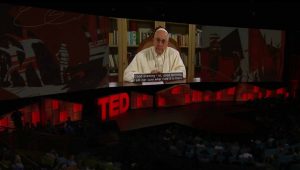
By Cian Molloy - 29 April, 2017
The world of social media was all a twitter earlier this week when Pope Francis popped up at this year’s TED Conference in Vancouver with a recorded speech on ‘Why the only future worth building includes everyone’.

Pope Francis gives his TED talk
TED is a media organisation that hosts an annual conference on ‘Technology, Entertainment and Design’ and then, under the slogan ‘ideas worth sharing’, shares all the speeches and contributions made at the event online. It is reckoned that, cumulatively since 2006, TED talks have been viewed over the internet more than 4.6bn times.
In his speech, recorded in early April, Pope Francis spoke in Italian, with English subtitles provided for the audience in Canada. But the online version has had subtitles made available in 22 languages – with another 18 to follow.
At nearly 18 minutes long, the Pope’s TED talk is significantly longer than the regular monthly ‘Pope’s Video’ reflection based on the Pope’s Intentions throughout the year. And visually the TED talk is less dramatic – throughout the talk the Pope is seated behind a desk at his Vatican residence.
After congratulating the organisers on the theme of this year’s event – ‘The Future You’ – in his usual simple and direct style, the Pope breaks down his talk into three distinct parts.
“First and foremost,” he says, “I would love it if this meeting could help to remind us that we all need each other, none of us is an island, an autonomous and independent ‘I’ separated from the other, and we can only build the future by standing together, including everyone. We don’t think about it often, but everything is connected, and we need to restore our connections to a healthy state.”
Secondly, he says: “How wonderful would it be if the growth of scientific and technological innovation would come along with more equality and social inclusion. How wonderful would it be, while we discover faraway planets, to rediscover the needs of the brothers and sisters orbiting around us. How wonderful would it be if solidarity, this beautiful and, at times, inconvenient word, were not simply reduced to social work, and became, instead, the default attitude in political, economic and scientific choices, as well as in the relationships among individuals, peoples and countries. Only by educating people to a true solidarity will we be able to overcome the ‘culture of waste’, which doesn’t concern only food and goods but, first and foremost, the people who are cast aside by our techno-economic systems which, without even realising it, are now putting products at their core, instead of people.”
After reflecting briefly on the Parable of the Good Samaritan, the Pope says: “The third message I would like to share today is, indeed, about revolution: the revolution of tenderness. And what is tenderness? It is the love that comes close and becomes real. It is a movement that starts from our heart and reaches the eyes, the ears and the hands. Tenderness means to use our eyes to see the other, our ears to hear the other, to listen to the children, the poor, those who are afraid of the future. To listen also to the silent cry of our common home, of our sick and polluted earth. Tenderness means to use our hands and our heart to comfort the other, to take care of those in need …
“The future of humankind isn’t exclusively in the hands of politicians, of great leaders, of big companies. Yes, they do hold an enormous responsibility. But the future is, most of all, in the hands of those people who recognise the other as a ‘you’ and themselves as part of an ‘us’. We all need each other.”
Reaction to the speech has been very positive, with TED’s international curator Bruno Giussani saying: “In this complicated and often confusing world, Pope Francis has become possibly the only moral voice capable of reaching people across boundaries and providing clarity and a compelling message of hope.”
A full transcript of the Pope’s TED Talk and a link to an English-subtitled recording of his address is available here: https://www.ted.com/talks/pope_francis_why_the_only_future_worth_building_includes_everyone/transcript?language=en.